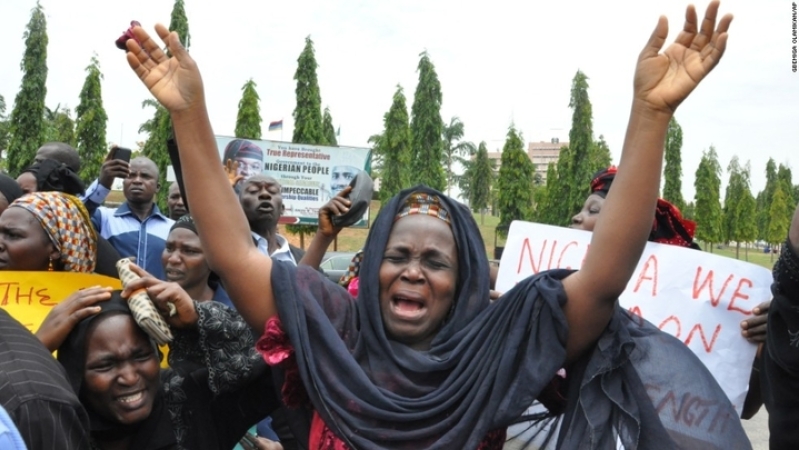
The Islamic extremist group Boko Haram has claimed that several of the Chibok schoolgirls who refused to be rescued as part of last week's swap deal with the Nigerian government did so because their hometown adheres to Christianity and not Islam.
The terrorist group recently released a video showing a girl dressed in a veil and holding a gun. The girl identifies herself as Maida Yakubu, one of 276 schoolgirls kidnapped by Boko Haram in April 2014, reports Al Jazeera. Three other girls in veils sit behind her as she proclaims her loyalty to the jihadist group.
When asked by a man in the background why she doesn't want to go back home to her parents, she replies: "The reason is that they live in the town of unbelief. We want them to accept Islam".
As reported, 82 schoolgirls who were kidnapped three years ago from the town were released last week after negotiations between the group and the government. Many of the Chibok girls were Christian, but were encouraged to convert to Islam and to marry their kidnappers during their time in captivity.
Last week, presidential spokesman Garba Shehu explained that one girl had refused to leave because she had married a Boko Haram fighter.
Fatima Akilu, a Nigerian psychologist, also told Reuters that many women and girls abducted by the Boko Haram sect identify with their captors and may not want to give up "their new lives with their militant husbands".
"They develop Stockholm syndrome, identify with captors and want to remain," added Akilu who has run deradicalization programs for Boko Haram militants and women they abducted.
"Some are afraid of what to expect, the unknown. We don't know how much influence their husbands have in coercing them not to go back."
Out of the 276 girls abducted in April 2014, 106 have either been released or found, leaving 113 still missing.
Meanwhile, a week after their release, 81 of the 82 girls have still not met their families. The only relative allowed to meet them was Yakubu Nkeki, chairman for the Chibok parents' group and a primary school teacher who taught many of the girls, according to the Guardian. He spent three hours with his niece, Maimuna Usman, 20.
"Today is a wonderful day. I saw the girls and Maimuna. When she saw me, she ran and grabbed me and started crying. I was so overwhelmed," said Nkeki on 8 May.
He added, "[The families] want them to receive all the care from the medical staff but they also want to be reunited with them as soon as they can. We're waiting on the government to let us know when this will be possible."
Since the start of Boko Haram's armed campaign in 2009, more than 20,000 people have been killed and more than 2.6 million made homeless in northeast Nigeria. In 2015, the group pledged allegiance to ISIS.
Earlier this week, Boko Haram killed at least six farmers who were working on their land near the northeastern Nigerian city of Maiduguri, according to Al Jazeera.
The fighters, on motorcycles, attacked the farmers who were preparing their fields for the rainy season outside Amrawa village, 16km from the Borno state capital, on Saturday afternoon.
"The gunmen attacked the farmers with machetes as they were clearing their farms that have been taken over by weed in preparation for the rains which start in few days," said Ibrahim Liman, a civilian militia member.







